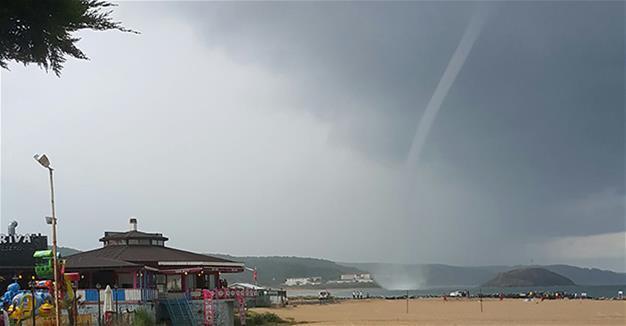Climate scientist warns of possible increase in number of whirlwinds in Turkey
ISTANBUL

A climate scientist warned on Aug. 24 that Turkey could see an increase in the number of whirlwinds and severe storms at the beginning and end of summers from now on.
Speaking at a climate panel organized by Greenpeace, Murat Türkeş, a professor of Physical Geography, Geology, Climatology and Meteorology at Istanbul’s Boğaziçi University, said there had been significant changes in Turkey’s climate in recent years, leading to flash floods.
“Beyond ordinary weather forecasts and climate studies, Turkey needs to develop expertise on inclement weather. Turkey is not very ready for this,” Türkeş said.
He was speaking after heavy rain and hail caused severe flooding in Istanbul twice over the summer, while a whirlwind was seen in the city’s Beykoz district earlier this week.
Türkeş said that due to recent dynamics in the climate, cold air coming into the country from the north and hot and humid air coming from the south - which previously only led to thundery showers – has instead been forming particles called “supercells,” which can cause whirlwinds in certain topographies.
The potential of similar whirlwinds appearing in Turkey was rising every day, with the risk concentrated at the beginning and end of the summer seasons, said Türkeş, a management committee member of Bogaziçi University’s Center for Climate Change and Policy Studies.
The risk is particularly concentrated in the country’s southern Mediterranean provinces, the Marmara region, the northern Aegean region, the western Black Sea region, and the southern province of Hatay, he added.
Another participant of the panel, Dr. Gamze Varol Saraçoğlu, a public health specialist speaking on behalf of the Turkish Medical Association, touched on the effects of climatic changes on human health.
She noted that greenhouse gases arising from coal thermal power plants in Turkey have particularly been leading to climate changes in the country, stressing that measures should be taken regarding this air pollution especially in the Marmara province of Tekirdağ.
“If you look at EU and the World Health Organization measures, there is not a single day in Tekirdağ [with acceptable air quality]. We are very worried about this. Air pollution causes very serious health problems, from respiratory tract irritation to death, as well as heart illnesses, circulation systems and strokes. Heavy metals such as mercury affect the central nervous system,” Saraçoğlu said.
 A climate scientist warned on Aug. 24 that Turkey could see an increase in the number of whirlwinds and severe storms at the beginning and end of summers from now on.
A climate scientist warned on Aug. 24 that Turkey could see an increase in the number of whirlwinds and severe storms at the beginning and end of summers from now on.